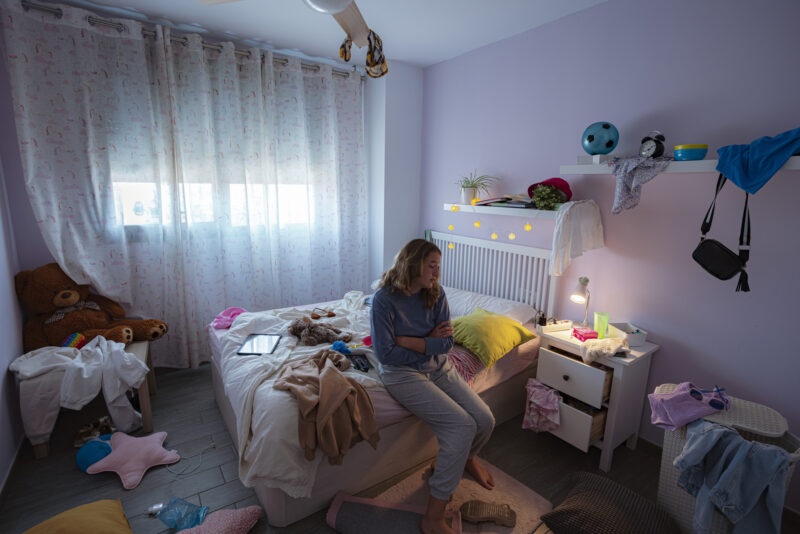
What Is Emotional Distance — and How Can You Overcome It?
3 min.
Emotional distance can weaken intimacy and trust. Discover why emotional disconnection happens and how to restore closeness in relationships.
Emotional distancing can quietly creep into relationships, leaving partners, friends, or family members feeling disconnected and unseen. Unlike a healthy need for space, emotional withdrawal reflects a deeper emotional disconnection that prevents intimacy and closeness. Whether it shows up in romantic relationships, family bonds, or friendships, it can erode trust and emotional attachment over time. Read on to learn more about why it happens, how it impacts relationships, and what you can do to cope.

If emotional withdrawal is taking a toll, support is available
Charlie Health’s virtual therapy programs can help you reconnect and heal.
What is emotional distance?
At its core, emotional distance is a gap that makes genuine connection difficult. Someone may be physically present yet emotionally unavailable, creating an emotional wall between themselves and others.
It’s important to distinguish between normal needs for space and harmful emotional drifting. While everyone requires downtime, persistent emotional disconnect often points to unresolved emotion, unmet needs in a love language, or even attachment disorders like reactive attachment disorder.
Causes of emotional distance
Emotional distancing rarely happens overnight. It often develops through stress, habits, and deeper issues. Common causes include:
- Stress and overwhelm: Academic pressure, career struggles, or post-traumatic stress disorder can trigger emotional withdrawal.
- Unresolved conflict: Avoiding difficult conversations creates an emotional wall and weakens the emotional bond.
- Attachment styles: People with avoidant attachment or attachment disorders may cope with stress by pulling away from intimacy and emotional bonding.
- Mental health struggles: Depression, anxiety, or emotional distress can make emotional closeness feel overwhelming.
- Past experiences: A history of neglect, betrayal, or narcissistic abuse can cause long-term emotional disconnection.
Signs of emotional distance
Sometimes emotional distancing is a protective response to deeper trauma or emotional abuse. In these cases, the emotional wall becomes nearly impossible to break without professional support. If emotional disconnection leaves you feeling invalidated, unsafe, or isolated, seeking therapy is essential.
Recognizing emotional drifting early helps prevent long-term damage. Some signs include:
- Surface-level conversations that avoid deeper emotion.
- Lack of empathy, emotional intimacy, or responsiveness.
- Decline in physical intimacy or physical affection.
- Increased irritability, resentment, or emotional distress.
- Feeling lonely despite being in a relationship.
These signals suggest an emotional disconnect that requires attention.
The impact of emotional distance
When emotional withdrawal goes unaddressed, it can take a toll on both relationships and mental health. For partners, it often leads to a decline in emotional intimacy, leaving needs for closeness, love language expression, and physical affection unmet. Within families, emotional disconnection can strain bonds, especially between parents and children. Over time, this persistent gap may erode trust and intimacy, making it harder to sustain healthy relationships. On an individual level, emotional withdrawal can worsen distress, anxiety, and depression—and in more severe cases, may even contribute to attachment-related issues such as attachment disorder or reactive attachment disorder.
How to overcome emotional distance
Although emotional drifting feels painful, it is reversible with effort and intentionality. Strategies include:
- Self-awareness: Recognize when you’re building an emotional wall and reflect on the underlying emotion.
- Open communication: Share feelings honestly and practice listening to foster emotional bonding.
- Quality time: Make space for meaningful conversation, shared experiences, and physical intimacy.
- Love languages: Learn and express each other’s love language to rebuild emotional closeness.
- Therapy: Individual or couples therapy can address emotional withdrawal and support healthier emotional attachment.
Overcoming emotional distance requires consistent care and commitment. By prioritizing empathy, intimacy, and open communication, couples and families can rebuild emotional bonds and avoid emotional drifting. With time, attention, and sometimes professional help, the emotional gap can close—making space again for trust, closeness, and a healthy relationship.
How Charlie Health can help
If you or a loved one is struggling with your mental health and could use more than once-weekly support, Charlie Health is here to help. Charlie Health’s virtual Intensive Outpatient Program (IOP) provides behavioral health treatment for people dealing with serious mental health conditions. Our expert clinicians incorporate evidence-based therapies into individual counseling, family therapy, and group sessions. With this kind of holistic online treatment, managing your mental health is possible. Fill out the form below or give us a call to start healing today.

